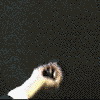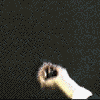“8”
Randy didn’t do things the easy way. He seldom did them the best way, either.
I recently recopied the score to “8”, a work that may very well be a masterpiece. There are multiple versions, and Randy’s mother wanted a good score of the final revision to be available. This extraordinarily subtle work for piano soloist with eight ball (in a side pocket, no less) was written in response to Mel Powell’s insistence that Randy produce something in classic sonata form. Mel was Randy’s teacher at the time; he must have thought the assignment would at least give them something to talk about in their lessons. I wonder if it did. There are no specified pitches in the whole piece, except for a brief quote from Ravel’s Bolero. It’s all contours in very simple rhythms (eighth notes in fact) – but that’s just the piano part. The piece is really about movement.
One of the things I tell my students is “Don’t reinvent the wheel.” That applies especially to notation. “If it ain’t broke, don’t fix it.” “8” involves a lot of choreography – hand and arm gestures, eight ball movements, etc. Randy devised a brand new note head with which to express these things – an eight-pronged asterisk on a stick. [The half note version looks like a toilet brush.] It’s cute, and it makes perfect sense – in theory; there’s no standard notation for a wrist-twist, so why shouldn’t it get its own note head? But it’s a copyist’s nightmare.
Toby Holmes likes to tell the story about Randy and Tim Bonenfant desperately trying to get the parts ready for the first performance of Places. Randy had (of course) made changes since the dress rehearsal. (You have to understand that Tim is a professional copyist and, like most, got his start with pen and ink.) The moment of crisis arrived when, while running off the revised parts, the printer ran out of toner! The performance was only hours away, and it was a Sunday. What could be done? Toby observed that there were pens, ink, and paper on the desk nearby. Randy and Tim spent an hour on the phone trying to find toner.
I took the easy way out and made Randy’s new note head a conventional, six-pronged asterisk (on a stick). Even so, the two-page score took me two days to copy on the computer. I could have done it in two hours by hand.
Community
Randy’s living room events were as much parties as concerts, and (like good parties) they engendered a real sense of community. But (unlike good parties) there was never enough beer.
I would usually show up at about the time the concert was supposed to start. A few people would be milling about, visiting, while others were trying to find more extension cords (there were never enough). Most of the performers weren’t even there yet. Randy would be climbing over or under furniture, tacking things to the wall, or laying speaker wire. One time he was tuning two pianos in quarter-tones.
ME (slightly insincerely, because I really wanted a beer): “Can I do something to help?”
RANDY (in total sincerity, as always): “No. Why don’t you get a beer. It’s next door.”
Next door they were already out of beer.
For one living room concert I told Randy I wanted to do a lecture on mixing the perfect martini. He couldn’t wait. He wasn’t a big drinker, but he knew that a martini is something special – taken too seriously by aficionados, and not seriously enough by anyone else – a lot like “new music”.
Well, after waxing on about the most sublime of cocktails for about fifteen minutes, the moment of truth came. Plenty of gin and vermouth; I even brought my own glassware. Time to mix ’em up and pass ’em around.
I decided to go for a real dramatic effect and said “Ice is like garlic…” as I walked away into the kitchen. [“What?”, you are asking. They were too.] “…You can never have enough”, I said as I returned.
Of course, Randy had forgotten to get ice; there was just enough for one perfect Martini. Not shaken, I stirred it up and we passed it around. A rather strange communion, but somehow it seemed wholly appropriate.
Soiree
My wife and I have a tradition of celebrating our birthdays with a “bad poetry soiree”. The last time I saw Randy was at one of these.
The premises for the evening are simple: open mike, the worse the better. The poetry stinks, the food is fabulous, and once the reading gets going the laughter doesn’t let up for long.
But Randy was able to slow things down – a lot. He decided to compose his poem on-the-spot, with everyone’s help, using some convoluted version of the game “Mad Libs”. One-by-one he took words from every single person in the room, jotting them on a scratch pad in the appropriate category. He was only halfway done gathering nouns before most of us had gotten up for more food or to get in line for the bathroom. Randy continued patiently, with the seriousness of a judge, although occasionally even an isolated word got a laugh from the room. Chas Smith’s contribution of “butt-plug” to the noun category is particularly memorable. (Randy didn’t even crack a smile.) Then, after he finally had all the words, we had to wait while Randy somehow shuffled them into a poem. Talk about a lead balloon.
But Randy’s gesture was brilliant. We all heard the poem coming, bit by bit, like a melody slowly composing itself from random notes floating in the air. Each new word added to the one before, creating images by association in each of our minds, but none of us guessing the final outcome. He made us wait, and the wait was worth it. Randy’s Mad-Libbed poem was hilarious, the laughter a great reward.
Our spirits quickly restored, and the party sprang back to life. But for a while we really thought Randy was the death of it.
Recognition
I told that story to one of his classmates from Yale. “That sounds just like Randy” was her reply.
Cage
Randy used to call me after Ear Unit concerts to discuss the pieces the group had played. During one of those conversations we got onto the subject of John Cage. That wasn’t hard to do with Randy; his veneration of the man is well-known. A personal letter discussing Satie’s Vexations, and a smooth rock that Cage had signed for him while on a walk along the beach were among Randy’s most prized possessions. But he was outgrowing the need for an artistic father figure. He had his own voice, and it was beginning to resonate.
That day, Randy confided that he was feeling guilty. He had started thinking “I almost wish Cage would die already so I can get on with my own work” and not long after, Cage died.
Lone Pine
I played in the premiere of Lone Pine. My job was to tap a water glass with a pencil, in imitation of the sound of a chain gently clinking against a flagpole in the afternoon breeze. I’m a pretty good percussionist; I figured I could do that. I’ve even been to Lone Pine, home of the “Burger and Fries Laundromat”, “Movie Road”, and a nice little hot spring (in which I’ve been butt-naked more than once).
But this wasn’t a typical Living Room Concert. The venue was rented – in Hollywood! I guess everyone took it very seriously. Randy rehearsed the flagpole clinkers to death.
Clink…..clink..clink.
“Yeah, sort of. But not quite. More like clink….clink…clink.”
Randy obviously had a very specific image in mind – a vivid memory that (apparently) couldn’t easily be conveyed. When I finally got it right he was beaming. “That’s it!” Now he just had to teach it to the other flagpole clinkers.
Of course there was a lot more to Lone Pine than just clinking, and none of it had been rehearsed before that evening – two hours before the concert (Randy had a lot of faith in people.). Even so, we had a great run-through. I was sure the performance would be great too. And it was – at least I thought so.
A lot of music happened that night. I didn’t have a chance to talk with Randy again until it was all over and we were packing up. Looking a little disappointed, he said “I wish we had recorded the run-through.”
“Why? It went great tonight.”
“It was okay, but the rehearsal was a lot better.”
I guess I’ll never know what was different.
Velvets
I guess I really didn’t know Randy all that well. For one thing, I didn’t know he was a Velvet Underground fan. How well can you say you knew someone if you didn’t know that?
When his parents were cleaning out his house they asked his friends to go through his records and take whatever they wanted. I left with all his VU albums.
Later his mother said “I’m so glad you got his Velvet Underground records. He loved them, and I was so worried that no one would take them.”
Happily Ever Endless
There was always a pleasant surprise for me at a Living Room Concert. Once, wandering down to the grove below the house, I found Mark Lightcap and Steve Goodfriend playing the theme from Endless Summer on guitar and drums. They repeated it continuously throughout most of the evening. I stood there under a tree and listened for a long time. I wasn’t nostalgic; I didn’t even know the tune. But their playing of it – simply, patiently, even lovingly – moved me. It just felt good.
That night, as usual, I returned home in good spirits. That’s why I kept going back to Randy’s living room, and still do – in memory.
listen to “Endless Bummer, for Randy” by arthur jarvinen :

Disclaimer:
These stories were written quite a while after the facts, not as historical documents but as a way of clarifying for myself, and perhaps for others, some aspects of what knowing Randy Hostetler and his work might have been about. Everything said here is true as far as I know or can remember, but to what extent every detail is literally so I can’t and wouldn’t care to say.
Arthur Jarvinen
March, 1999
copyright 1999 Arthur Jarvinen


